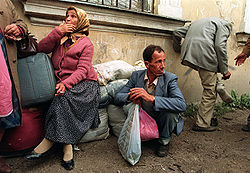Our website is made possible by displaying online advertisements to our visitors.
Please consider supporting us by disabling your ad blocker.
Carthu ethnig
| Enghraifft o: | dilead, trosedd yn erbyn dynoliaeth |
|---|---|
| Math | ffelwniaeth, Gwrthdaro ethnig, mudo gorfodol |
| Achos | Cenedlaetholdeb |

Mae'r ymadrodd carthu ethnig hefyd glanhau ethnig yn dynodi amrywiaeth o gamau gweithredu sydd â'r nod o gael gwared trwy drais (hyd yn oed drwy droi at weithredoedd trais neu ymddygiad ymosodol milwrol) o diriogaeth poblogaeth lleiafrif ethnig-ddiwylliannol i ddiogelu hunaniaeth a homogenedd grŵp ethnig.[1][2][3] Er bod y weithred yn ymestyn yn ôl drwy hanes, gan gynnwys enghreifftiau yn y Beibl, mabwysiadwyd y term "ethnic cleansing" fel cyfieithiad o'r mwythair o'r Serbo-Croateg yn ystod rhyfeloedd Iwgoslafia yn yr 1990au.
Mae'n drosedd yn erbyn dynoliaeth a gall hefyd ddod o dan y Confensiwn Hil-laddiad, hyd yn oed gan nad oes gan lanhau ethnig unrhyw ddiffiniad cyfreithiol o dan gyfraith droseddol ryngwladol.[1][4][5]
- ↑ 1.0 1.1 "Ethnic cleansing". United Nations. United Nations Office on Genocide Prevention and the Responsibility to Protect. Cyrchwyd 20 December 2020.
- ↑ Walling, Carrie Booth (2000). "The history and politics of ethnic cleansing". The International Journal of Human Rights 4 (3–4): 47–66. doi:10.1080/13642980008406892. "Most frequently, however, the aim of ethnic cleansing is to expel the despised ethnic group through either indirect coercion or direct force, and to ensure that return is impossible. Terror is the fundamental method used to achieve this end.
Methods of indirect coercion can include: introducing repressive laws and discriminatory measures designed to make minority life difficult; the deliberate failure to prevent mob violence against ethnic minorities; using surrogates to inflict violence; the destruction of the physical infrastructure upon which minority life depends; the imprisonment of male members of the ethnic group; threats to rape female members, and threats to kill. If ineffective, these indirect methods are often escalated to coerced emigration, where the removal of the ethnic group from the territory is pressured by physical force. This typically includes physical harassment and the expropriation of property. Deportation is an escalated form of direct coercion in that the forcible removal of 'undesirables' from the state's territory is organised, directed and carried out by state agents. The most serious of the direct methods, excluding genocide, is murderous cleansing, which entails the brutal and often public murder of some few in order to compel flight of the remaining group members.13 Unlike during genocide, when murder is intended to be total and an end in itself, murderous cleansing is used as a tool towards the larger aim of expelling survivors from the territory. The process can be made complete by revoking the citizenship of those who emigrate or flee." - ↑ Schabas, William A. (2003). "'Ethnic Cleansing' and Genocide: Similarities and Distinctions". European Yearbook of Minority Issues Online 3 (1): 109–128. doi:10.1163/221161104X00075. "The Commission considered techniques of ethnic cleansing to include murder, torture, arbitrary arrest and detention, extrajudicial executions, sexual assault, confinement of civilian populations in ghetto areas, forcible removal, displacement and deportation of civilian populations, deliberate military attacks or threats of attacks on civilians and civilian areas, and wanton destruction of property."
- ↑ Jones, Adam (2012). "'Ethnic cleansing' and genocide". Crimes Against Humanity: A Beginner's Guide (yn Saesneg). Simon and Schuster. ISBN 978-1-78074-146-8.
- ↑ Schabas, William A. (2003). "'Ethnic Cleansing' and Genocide: Similarities and Distinctions". European Yearbook of Minority Issues Online 3 (1): 109–128. doi:10.1163/221161104X00075. "'Ethnic cleansing' is probably better described as a popular or journalistic expression, with no recognized legal meaning in a technical sense... 'ethnic cleansing' is equivalent to deportation,' a grave breach of the Geneva Conventions as well as a crime against humanity, and therefore a crime within the jurisdiction of the Tribunal."
Previous Page Next Page


